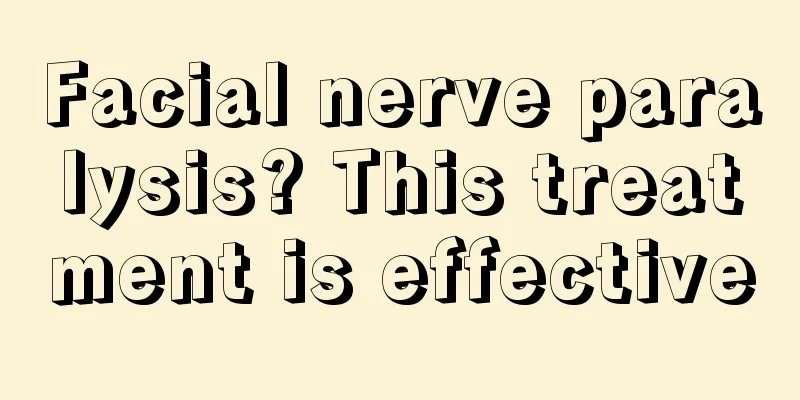Why does a cold cause nosebleeds

|
When people have a cold, they will have a high fever. At this time, they must replenish water in time to avoid severe dehydration due to fever. When you have a fever, your nasal cavity will become particularly dry, which can easily cause the capillaries in your nasal cavity to rupture. If conditions permit, when you have a cold, apply a wet towel to your nose to relieve the dryness in your nasal cavity. Why does a cold cause nosebleeds? A cold causes congestion in the nasal mucosa. Picking or blowing your nose often causes the congested mucosa to rupture, leading to nosebleeds. The main treatment is local symptomatic treatment. Plug your nose for a nosebleed If you have a nosebleed, immediately find some toilet paper and roll it into a ball the size of your nostril and plug it with it. Remember not to look up, but look straight ahead or lower your head slightly. Apply ice to your neck Immediately apply ice cubes, ice water or cold water to the back of the neck, mainly to reduce the temperature and accelerate the contraction of capillaries to accelerate bleeding. Sit back and rest for a while After treatment, remember not to walk around or exercise. Sit quietly for a while. The nosebleed will usually stop within 5 minutes, and then you can remove the paper ball blocking the nose. If the nosebleed fails to stop for a long time, please go to a professional hospital immediately. Apply medicine Many nosebleeds caused by colds are caused by dry nostrils. At this time, it is best to apply some "chlortetracycline hydrochloride ointment" every day to keep the nostrils moist, which can also effectively reduce the possibility of nosebleeds. Go to a specialized hospital for treatment If you have frequent nosebleeds or the bleeding is difficult to stop, please go to a professional hospital for treatment. I have frequent nosebleeds. After going to the hospital for examination, it was found that I had "mucosal erosion and vascular dilation in the bilateral K's zone of the nose", which caused capillaries to rupture and bleed easily when the weather was dry or when I rubbed my nose. It was finally solved through "electrocoagulation" in a professional hospital. Foods to avoid when you have a cold: High-fat, greasy foods During a cold, appetite will decrease. Eating greasy food will make your appetite worse, and you will not be able to absorb enough nutrients. Your immunity will be affected. Eating this kind of food when you have a cold can easily cause symptoms such as nausea. Strong tea, strong coffee Strong tea and strong coffee can cause gastrointestinal discomfort and sometimes may trigger gastroesophageal reflux. When there are symptoms of nasal congestion, it may even affect the nasal cavity and cause discomfort. Spicy Food Spicy foods such as chili peppers can make the fragile gastrointestinal function more disordered and even cause the risk of nausea and vomiting. Crude fiber food During a cold, people's gastric motility is weak, so during this period, you should try to avoid eating crude fiber foods such as celery, leeks, and Chinese cabbage, otherwise it will increase the burden on the gastrointestinal tract. High-salt foods Reducing salt intake can increase the lysozyme content in saliva, protect the epithelial cells of the oral and throat mucosa, and allow them to secrete more immunoglobulins and interferons to fight the cold virus. But you cannot do without salt when you have a cold, because the body will lose some sodium ions during the process of sweating, and the salt used in cooking is a supplement to sodium ions. During a cold, just limit your daily salt intake to 5 grams. Sweets Although eating sweet food may make your throat feel more comfortable when you have a cold, especially when you have a cough, high-sugar fruits and desserts should be avoided during a cold. Sweets not only increase the viscosity and amount of phlegm, but also cause abdominal bloating and suppress appetite. High-sugar fruits include mango, grapes, lychees, sugarcane, pineapples, red dates, etc. |
<<: What is the reason for recurrent nosebleeds
>>: The right thing to do when you have a nosebleed
Recommend
How to make sweet potato strips with sweet plums
Sweet potato strips with sweet plums are a snack ...
How to insert a tampon
Many friends also call tampons sanitary plugs. It...
Can I have surgery for astigmatism?
The problem of astigmatism is caused by a person ...
What foods should you eat more to prevent liver cancer? Doing these things can easily prevent liver cancer
"Liver cancer has no symptoms in its early s...
What is the best way to repair hair damage
Modern people pursue individuality, and they ofte...
How to lose weight after drinking alcohol
Drinking is now an indispensable procedure at the...
What can I do with expired yogurt?
I believe that many people have drunk yogurt in t...
What are some porridges that nourish the spleen and stomach?
The function of the spleen and stomach can almost...
How to dry roses
Roses are beautiful and charming, and I believe t...
What to do if breast cancer is in late stage and the pain is unbearable
What should I do if I suffer from unbearable pain...
Can baking soda be used to wash your face?
Brushing teeth and washing face are things that e...
Revealing the late symptoms of cervical cancer to you
Cervical cancer is one of the most common maligna...
What is the best diet for advanced lung cancer? The most complete diet recipes for advanced lung cancer
Cancer is a disease that can cause death, and the...
8 high-risk factors for prostate cancer
As the incidence of prostate cancer gradually inc...
Lung cancer caused by objective factors
In our real life, many people suffer from lung ca...









